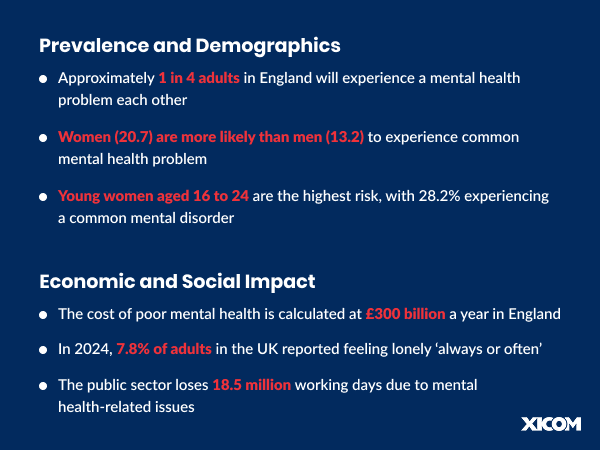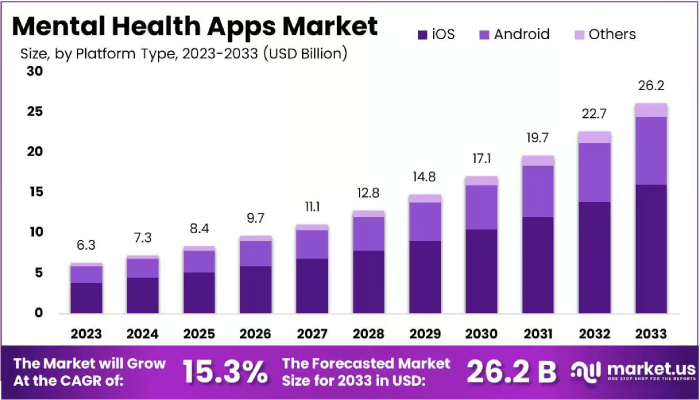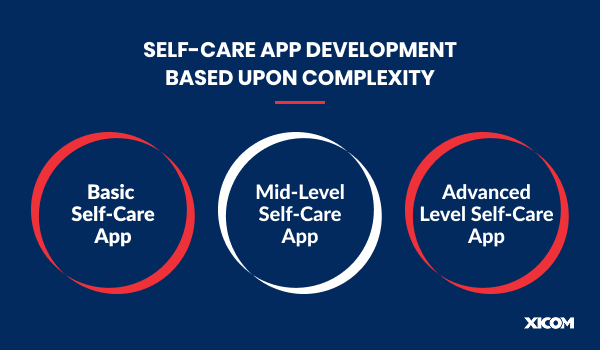Mar 24, 2025 App Development
How Much Does It Cost to Create a Self-Care App Like Happify?
Mar 24, 2025 App Development
Table of Contents
Mar 24, 2025 App Development
So how much does it cost to create a self-care app like Happify practically? This would probably be your first question when you decide to create a self-care app.
Roughly any leading IT firm will quote you to develop it for $20,000 to $50,000+. But before you take it as a final quotation, think about what services exactly this estimation included and why there is a huge gap between the pricing.
The real fact is, that nobody can provide you with the exact cost to build a self-care app like Happify, until or unless you don’t decide what exactly you want in your app. Hence, there are several factors that directly or indirectly impact the average cost of creating a self-care app.
But, before venturing into creating a self-care app and making a huge investment to build this app, it is important to recognize why there is an urgent need to create a well-being app and how long it will be demanded by the users.
Let’s get into the big picture!
The World Health Organization estimates that 1 in every 6 adults is experiencing a common health problem such as depression or anxiety. Over 600 million people are globally suffering from depressive disorders and the most depressing part is that three/a third of people are not even getting any kind of help they need. It may be because of financial or other reasons. Suffering people may be not able to afford the visit to a professional psychologist or are afraid of opening up with people.
Here are some serious stats that you need to understand:

With the increasing number of mental illness cases, the demand for self-care apps like Happify has kept surging among people. Happify-like self-care apps are nothing short of providing positivity and a calming feeling to people.
But what exactly is Happify and why many businesses are looking to hire a mobile app developer to create a similar app? Let’s quickly get into the basics of this app…
In today’s fast-paced world, mental health and overall well-being have become a priority concern for many people. This is where self-care apps like Happify are taking advantage as they are designed to help individuals take control of their emotional and mental health through structured insights and scientifically backed techniques.
These apps are focused on enhancing user’s emotional resilience, reducing stress, and improving their overall quality of life. In today’s digital era, self-care apps are considered digital tools that help users maintain their mental, emotional, and physical well-being by allowing them to access various therapies and wellness programs in apps.
The best part about these apps is that they act like personal wellness assistants, making self-care accessible anytime and anywhere.
Here’s why they are gaining popularity:
So you are impressed with the concept and ready to build a custom self-care app like Happify?
Let’s find out what type of self-care apps cover under this umbrella.
When it comes to developing a self-care app like Happify, you need to understand that it offers multiple features ranging from gaming to meditation, sleep monitoring to fitness and wellness in an app.
Various people have different concerns, so to address such mental and well-being disorders, what type of different apps can you develop? Here are a few suggested mobile app ideas that you can refer to develop individually:
In the digital era, where people are getting addicted to digital screens, chasing fast-paced lifestyles, and trying hard to strike a perfect balance in their daily lives, it becomes challenging to get mental peace for them. This ultimate situation leads to the ultimate pressure on mental well-being which further turns to depression and anxiety.
This is where mental health and therapy apps come into the role and provide a perfect tool for users to manage stress, anxiety, and depression through various psychological techniques. These apps are integrated with Cognitive Behavioral Therapy (CBT), mood tracking, meditation, and AI-based chatbots to support users’ emotional well-being.
The global mental health apps market size is expected to grow at a CAGR of 15.5% and is predicted to make $20.92 billion by 2033.

Therefore, the demand for such apps will rapidly grow in the future. But, what do these apps do?
The estimated cost to develop a self-care app like Happify offering these features will take around $12,000 to $15,000+, depending upon your business requirements.
These apps are designed in a way to help users practice meditation, mindfulness, and stress management techniques to improve their emotional and mental well-being. They provide guided sessions for relaxation and sleep to enhance your focus on core activities. They provide guided sessions for relaxation and sleep that overall enhance the focus.
Sleep tracking apps help users analyze and improve their sleep quality by monitoring sleep cycles and offering relaxation techniques. The best part about these apps, they offer customized relaxation techniques that vary depending on the users. It uses AI-powered algorithms to provide insights into sleep patterns and help users create a better bedtime routine.
To get started with this app type, all you need is to determine the self-care app cost and hire a mobile app development company that enables you to translate your app idea into a perfect solution.
In a nutshell, these are a few major app types that you can consider developing while entering into the self-care app development process. However, the ultimate success will depend upon the features and functionalities you put into the app.
So how will you prioritize the features? And what functionalities would you prefer including in the app…let’s get into it!
No matter what type of self-care app you are likely to create, make sure it has an ample amount of features that not just make it engaging but also ensure hassle-free functionality.
Also, when it comes to determining the cost to create a self-care app like Happify, the features and functionalities you decide to prioritize in the app will have a direct and major impact on the budget. So here we have a list of essential features that you can prioritize in the self-care app.
| Feature Category | Feature Name | Description |
| User Management | User Registration & Login | Sign up via email, phone, or social media for secure access. |
| Profile Customization | Allows users to set goals, and preferences, and track progress. | |
| Multi-Device Sync | Seamless synchronization across mobile, tablet, and web. | |
| Mental Health & Well-being | Mood Tracking | Users can log emotions daily and monitor mental health patterns. |
| Guided Meditation | Pre-recorded or live sessions for stress relief and mindfulness. | |
| Cognitive Behavioral Therapy (CBT) Exercises | Scientifically proven exercises to help users manage thoughts and emotions. | |
| Stress Management Tools | Relaxation techniques, breathing exercises, and stress-relief activities. | |
| Engagement & Interactivity | Personalized Self-Care Plans | AI-driven customized programs based on user preferences. |
| Gamification | Rewards, achievements, and challenges to keep users motivated. | |
| Community Support | Peer groups, forums, or chatrooms for shared experiences. | |
| Push Notifications & Reminders | Daily reminders for self-care activities and goal tracking. | |
| Content & Education | Self-Help Articles & Videos | Expert-driven content on mental health, wellness, and lifestyle. |
| Audio Therapy & Podcasts | Audio-guided therapy sessions and motivational talks. | |
| Expert Consultation | Access to therapists, wellness coaches, and certified professionals. | |
| Tracking & Insights | Progress Dashboard | Visual representation of self-care journey and improvements. |
| AI-Powered Insights | Predictive analytics for mood patterns and behavioral changes. | |
| Sleep & Wellness Tracking | Integrated tools to monitor sleep patterns, physical activity, and overall wellness. | |
| Monetization & Accessibility | Freemium & Subscription Models | Free basic features with premium plans for advanced functionalities. |
| In-App Purchases | Users can buy guided sessions, therapy packs, or exclusive content. | |
| Accessibility Features | Voice assistance, dark mode, and customizable font sizes for inclusivity. | |
| Security & Compliance | Data Privacy & Encryption | End-to-end encryption for user data protection. |
| HIPAA & GDPR Compliance | Ensures compliance with healthcare and data privacy regulations. |
If you are a startup or an aspiring enterprise looking to create a full-fledged app like Happify, then you need to embrace the advanced features that ensure better engagement and user retention.
So here we have suggested some of the additional high-end functionalities that can help you build a next-level self-care app:
Today, if you want to stay ahead of everything, then using AI and ML capabilities has become quite essential for investors. Before you look forward to hiring dedicated developers, it is important to understand where to implement AI-driven features:
Incorporating these features by hiring a software development company and embracing a competitive edge but the cost to create a self-care app like Happify will suddenly increase. So how much finally do you need to invest in creating a self-care app?
Let’s get into the details…
The estimated cost to develop a self-care app like Happify depends upon various factors including the complexity of the app, features and functionalities, UI/UX Design, app development and geolocation, and more matters the most.
Still, different app development companies have different pricing structures, that you can’t guess until or unless you won’t get into the details of it. To help you frame a rough idea about how much you may need to spend on a self-app development project, here we have categorized the cost based on the complexity of the app:

These are the rough estimations that can vary depending on your unique requirements. It is always recommended to hire a software developer who can access your requirements, build a strategy, and prioritize the features and roadmap. Evaluating every factor of your app development will help you estimate the real cost of your project.
You may have developed a brilliant self-care app, but what if it is not generating any money for you? Well, the ultimate decision about developing an app is to generate money and for this, you need to adopt the best monetization strategies that help you make a profit.
To monetize your self-care app well, it is best to understand how Happify generates revenue.
Well, it keeps the basic features free to access, while advanced features come with the paid subscriptions, which is an attractive way to lure users on the app.
The paid versions may initially limit the daily access but ensure unlimited fun stuff for the users. You just need to track the insights to avoid delivering a frustrating experience to the users even in the free versions.
Here are the few best ways to monetize your app:
Provide access to additional features based on subscription plans that can vary based on monthly, quarterly, or yearly payments. This is one of the most steady revenue-generating streams, but plans must be budget-friendly.
Allow third-party businesses to advertise their brand by providing a free space on your app screen. This is an ultimate way of generating money, but avoids bombarding a user with the advertisements.
Try working with the brands that are connected to your app’s goals and can improve the app experience for users. For example, prefer listing wellness goods, medical services or mindful yoga classes or trips.
While advertising, try to create a perfect harmony with users!
Hopefully, this blog has given you some valuable insights into developing a self-care app like Happify and its cost estimations. As the demand for self-care apps keeps increasing among businesses and customers, it is high time to hire a mobile app development company that understands your app idea and can develop it in the way it has envisioned. This is where Xicom is incorporated as a leading software development company that transforms businesses and their ideas digitally and ensures sustainable growth.
If you are ready with the app idea and looking for the perfect team to develop a perfect solution, then get in touch with our team.
Here we have gathered additional information related to developing a self-care app like Happify and its cost estimations.
Self-care app development costs like Happify can greatly vary depending upon multiple factors including complexity of the app, its design, app development team, and more. So overall, the average cost to develop a self-care app is ranging between $20,000 to $50,000+, depending upon the requirements.
The average time to build a self-care app like Happify ranges between 3 to 5 months or may take even longer to 7 months depending upon what features and functionalities you are trying to integrate in the app.
To create a native self-care app, you can leverage Swift, Kotlin, Objective-C, or Java whereas for cross-platform apps, it is worth choosing React Native, Flutter, or Xamarin.
We have a team of experts who regularly conduct performance analysis and test it for bugs. Also to make it run smoothly, we update the app with the latest features and top technologies.